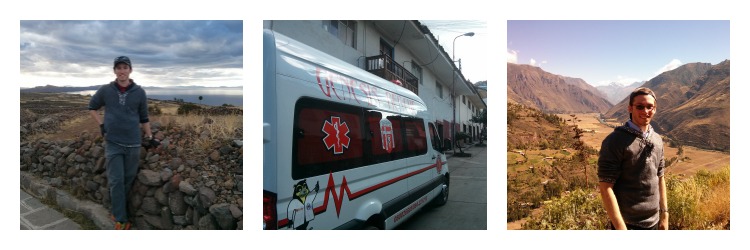
“Yair,” the nurse said in a serious tone, “necesito que me ayudes”—“I need you to help me.”
The urgent request occurred while I was working in the O2 Traveler’s Clinic in Cusco, Peru, as part of Einstein’s Global Health Fellowship Program‘s medical Spanish program this past summer. There, I was part of the team; I worked with doctors, nurses, pharmacists and patients.
“Sin problema,” I responded—“not a problem”—not knowing exactly what I was agreeing to explain, but at ease after having explained countless medical conditions, medicine schedules, how insurance works and many other topics to patients in both Spanish and English while volunteering in the clinic. Translating between English-speaking travellers and for my Spanish-speaking colleagues had built my confidence in conversational and medical Spanish, skills I had wanted to develop for my work back in the U.S.
The nurse led me into the room where I found two more nurses; a frustrated, elderly Australian woman lying on the bed; and her husband, sitting beside her.
“What’s the problem?” I asked.
“They want to stick me again,” the patient responded. “They blew up this arm, which hurt, because they stuck me wrong, and now they want to try again on the other side.” She showed me her swollen left arm.
“What happened?” I asked the nurse. She explained that the IV infiltrated, which is painful because it means the needle had migrated out of the vein, allowing fluid to get into the surrounding tissue, causing swelling. It’s bad, but only temporarily.
“Does that happen often?” I asked. “Not very often, but it happens,” the nurse replied. She explained to me that they needed the IV in order to be able to administer medications easily to the patient.
Turning back to the patient, I explained why they needed to put the IV in. “But they’ll mess up again,” she exclaimed. She was scared and angry, asking, “How do I know they won’t mess up again? The nurses and doctors here are not the same as in my country. I think I want to leave this hospital. I don’t mean to offend you.”
“Is there a chance we’ll miss the vein again?” I asked the nurse. “We will be very careful this time,” she said.
I translated her response to the patient, who suggested that I could insert the IV; having introduced myself as a student apparently hadn’t been enough to negate the “doctor” look of my white coat. Still, she preferred no IV, and I could not agree to insert the IV, having never done the procedure before. The negotiations became a bit tense, with me relaying messages between the patient and the nurse, until I came up with a compromise.
“Could we wait until the patient has a diagnosis before inserting another IV?”
“Yes,” agreed the nurse.
I asked the patient, whose swelling had already receded by then. “Yes,” she agreed. At last all parties involved could feel a sense of relief.
I checked in on the Australian couple before I left work that day. “Everything solved?” “Yes,” the husband responded, “I wish every doctor was like you, and cared so much for their patients. You do a very good job.”
I walked out of work and onto the streets of Cusco, happy that I had made a difference in the clinic.
Reflecting on the incident later, I realized how valuable it is to stop and listen. How good it is to genuinely care for the well-being of those we treat. How nice it is to reach a compromise.
I went to Peru with a heart willing and eager to learn and do all I could, and I left with lessons: not just of language and technique, but of humanity and compassion. These are lessons that apply not just in Peru, but here in the Bronx and in my continued medical career.

